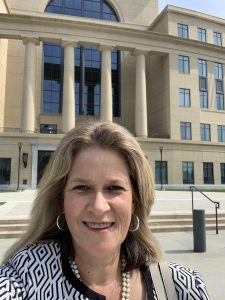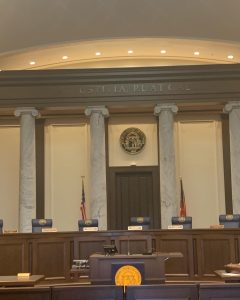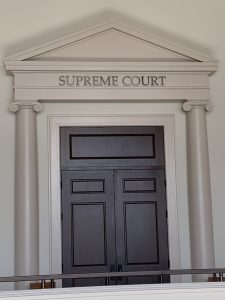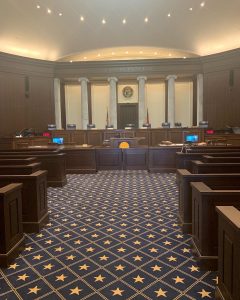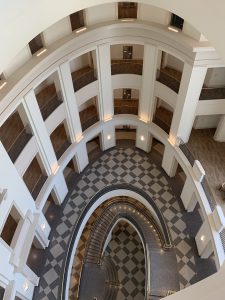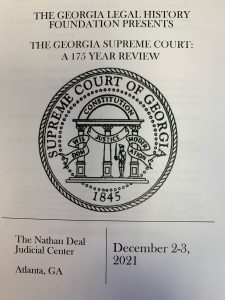Oyez, Oyez! Oyez! All persons having business before the Honorable, the Supreme Court of Georgia, are admonished to draw near and give their attention, for the Court is now sitting. God Bless the State of Georgia and this Honorable Court. May it please the Court.
Yesterday, I was honored to speak in the Georgia Supreme Court as part of the Court’s 175th Anniversary Celebration. The Celebration began Wednesday evening with a lovely dinner at The Commerce Club. Thursday was a full day of seminar on the history of the Supreme Court and biographies of various former Justices. I spoke about the creation of the State Bar of Georgia in 1964, which was approved by the Georgia Supreme Court and five years later held to be Constitutional in two separate cases. It was one of the highest honors of my career. I am sharing with you below my presentation.
We are very fortunate to have the Georgia Supreme Court and the State Bar of Georgia, which, together, protect your rights to live in a Just society, grounded in the Rule of Law, so that all may reap the benefits and rewards that our system of Justice provides.
CELEBRATING 175 YEARS OF THE SUPREME COURT OF GEORGIA ROBIN FRAZER CLARK
DECEMBER 2, 2021
Mr. Chief Justice, Members of the Court, Governor Deal, Mrs. Deal, Distinguished
Guests and Friends:
Greetings on behalf of the State Bar of Georgia. I am extremely honored to be here with you today on this remarkable occasion representing the State Bar of Georgia as the 50th President of the State Bar of Georgia when I served in 2012-2013. The State Bar of Georgia has had a long-standing relationship with the Supreme Court of Georgia, based on mutual respect and common goals. We are proud of that relationship and in recent years the State Bar Leadership and the Board of Governors have taken great strides to foster and maintain that relationship by working to protect the independence of the Judiciary and maintaining the ability to govern ourselves as a profession with the supervision of the Supreme Court, and not the Georgia Legislature, to regulate the practice of law. Many of our speakers today and tomorrow will retell much of the history of the Georgia Supreme Court with you. I am here today to share with you what perhaps is arguably the finest moment of the Georgia Supreme Court in connection with the State Bar of Georgia, when the Supreme Court approved the formation of and then later upheld the constitutionality of the mandatory State Bar of Georgia.
This relationship started over 60 years ago when the State Bar of Georgia, also known as The Unified Bar, was formed. Come back with me to Yesteryear, if you will, to 1964, and what was happening then with regard to the formation of the State Bar of Georgia. Much of my presentation was inspired by the book “From Banished to Unified, A History of the Legal Profession in Georgia,” which was written by Linton S. Johnson, and was the brainchild of Past President of the State Bar, and my good friend, Buck Ruffin. And also by a paper written by Jennifer M. Davis entitled “A Walk Down Memory Lane” and by the “Unauthorized and Unabridged History of the Supreme Court of Georgia,” written partly by former Chief Justice Harold N. Hill, Jr.
First, a tiny bit of ancient history. When the British Colony of Georgia was established in 1750, lawyers were banned. It wasn’t until 1755 that lawyers were permitted to practice in Georgia. It was not until 90 years later, in 1845, that Georgia established its own Supreme Court, the oldest state in the Union to create one. In a joint session, the Georgia Legislature elected the first three Supreme Court Justices: Joseph Henry Lumpkin, 46, of Oglethorpe County; Hiram Warner, 43, of Meriwether County; and Eugenius Nisbet, 42, of Bibb County. All middle-aged white men. Georgia enacted its first Code of Laws in 1860, and with that, the practice of law in Georgia was off and running as was its only appellate court. At the time of the creation of the Supreme Court, Georgia’s population stood at approximately 800,000.
After an ugly Civil War and then Reconstruction, the Georgia Bar was growing but it was not organized in any fashion as many other state bars were. The American Bar Association had been created in 1878. In the summer of 1883, a group of Georgia attorneys, mainly members of the ABA, met at the State Library in downtown Atlanta to discuss establishing a statewide bar association. This started a conversation that would last over 70 years.
That group of lawyers meeting in the State Library created the Georgia Bar Association, a voluntary professional organization whose stated purpose was “to advance the science of jurisprudence, promote the administration of justice throughout the state, uphold the honor of the profession of law and establish cordial intercourse among the members of the Bar of Georgia.” Membership was exclusive and by invitation only. In 1880 there were 1,432 lawyers in Georgia but the number of members in the Georgia Bar Association was only 167. All white males. Regarding the possibility of adding women lawyers, a speaker at a bar association symposium said: “Georgia is not yet ready to swap wifehood and motherhood even for female legal lore. The Georgia Code does not lend its influence to bring woman down from her present high estate.” Chief Justice Logan E. Bleckley giving a speech entitled “The Future of Woman at the Georgia Bar,” said “Rearing lawyers is a higher vocation than practicing law. To be the mother of a great lawyer ought to content and does content a true woman more than to be a great lawyer herself.”
During the next 50 years, more and more men became Georgia Lawyers and joined the Georgia Bar Association. One accomplishment of the Association was to obtain the passage of the 1932 Act which required all applicants for admission to the Bar to pass a written examination. The Bar Association repeatedly sponsored bills in the Georgia General Assembly to incorporate the Bar with no success. In one rather memorable attempt at passage, Harley Lawson, President of the Georgia Bar Association at the time in the early ‘40’s, testified in front of the House Judiciary Committee and was cross-examined by a member of the committee who was also a lawyer. The Committee Member asked Lawson: “Isn’t the main purpose of this bill to fix it so that the leaders of the Association can disbar a lawyer that they don’t like?” Lawson replied: “No, but I can tell you the type of lawyer we would get rid of. “What kind of lawyer is that?” the Committee Member asked. Lawson responded: “The lawyer who charged a poor widow a 50 percent fee on a $5,000 policy of life insurance on her deceased husband, when all he did was to fill out the printed form as to the proof of death.” The Committee Member asked no further questions. When Lawson came down from testifying, he was asked why the Committee Member asked no more questions. Lawson replied: “He was the lawyer who charged the widow the 50 percent fee.”
This lack of regulation of unethical conduct by Georgia lawyers made it obvious that a system of regulation was sorely needed. The Georgia Bar Association’s Committee on Legal Ethics and Grievances acknowledged its shortcomings in redressing lawyer misconduct. A mere restatement of ethical rules was clearly insufficient. The consensus became that a unified State Bar with mandatory membership was necessary to establish a system for investigating egregious acts committed by attorneys to the detriment of their clients and a mechanism for disciplining lawyers. Georgia lawyers, like most other professionals, wanted the right to police their own ranks.
It was under the leadership of then President of the Georgia Bar Association H. Holcombe Perry, Jr. of Albany, who was widely regarded as the Father of the State Bar, that the last great push for a mandatory state bar occurred. This included constant lobbying of key legislators and a public relations effort of obtaining Editorial Support from editors of Georgia newspapers to write key editorials supporting the passage of the bill. Finally, in 1963, on the last day of the session, March 4, the Georgia General Assembly passed the bill creating the mandatory State Bar of Georgia, creating the long sought-after unified bar. On Monday, March 11, 1963, a signing ceremony was held in Governor Carl Sanders’s office. Governor Sanders called it “a major victory, a signal victory for the lawyers in this state who conducted themselves as they should.” And then, in what can hardly be described as subtle self-promotion, Governor Sanders said, “If I hadn’t agreed to get behind it, it never would have passed.”
Now it just needed approval by the Georgia Supreme Court. The State Bar filed a Petition for Approval with the Georgia Supreme Court in April 1963 and a hearing was held on October 21, 1963. On December 6, 1963 the Supreme Court entered an Order establishing the State Bar of Georgia. Finally, success! And a new beginning!
But in the words of Coach Lee Corso, “Not so fast!” Fairly quickly, two constitutional challenges to the State Bar were filed, Wallace v. Wallace and Sams v. Olah. And, here’s a spoiler alert: both challenges failed.
The first challenge arose from a contested election for district attorney for Clayton Co. between Albert E. Wallace and Albert B. Wallace. Albert E. won and Albert B. sued on the grounds that Albert E. was ineligible to hold office because he failed to register with or pay his State Bar dues since the creation of the State Bar of Georgia. Albert E’s defense was the State Bar was unconstitutional. Albert B won in the trial court and Albert E immediately appealed to the Supreme Court of Georgia.
In Wallace v. Wallace, 225 Ga. 102 (1969) the Supreme Court noted that the “substantial question made by these attacks, as we view them, is whether the authority given the Supreme Court to create the State Bar of Georgia was legislative power. Without doubt, the answer is no.” The Court noted the inherent power of the Court and held the “right to define and regulate the practice naturally and logically belongs to the judicial department of the state government.
Indeed, it has been said that the courts have an inherent power to regulate the conduct of attorneys as officers of the court, and to control and supervise the practice of law generally, whether in or out of court. While it is in the prerogative of the judicial department to regulate the practice of law, the legislature, under the police power, may act to protect the public interest, but in so doing, it acts in aid of the judiciary and does not supersede or detract from the power of the courts.” The Wallace Court further expounded on what was the “inherent power of the Court”:
The power to regulate the conduct and qualifications of its officers does not depend upon constitutional or statutory grounds. It is a power which is inherent in this court as court-appropriate, indeed necessary, to the proper administration of justice. Inherent power arises from the fact of the court’s creation or from the fact that it is a court. It is essential to its being and dignity and does not require an express grant to confer it. Under our form of government, it is the right that each department of government has to execute the powers falling naturally within its orbit when not expressly placed or limited by the existence of a similar power in one of the other departments. The term ‘inherent power of the judiciary’ means that power which is essential to the existence, dignity, and functions of the court from the very fact that it is a court. Also, this court has long recognized the inherent power of the judiciary. That the courts possess certain inherent powers, is a proposition which, so far as we know, has never been questioned. This means, then, when the Constitution declares that the legislative, judicial and executive powers shall forever remain separate and distinct (art. 1, sec. 1, par. 23), it thereby invests those officials charged with the duty of administering justice according to law with all necessary authority to efficiently and completely discharge those duties the performance of which is by the Constitution committed to the judiciary, and to maintain the dignity and independence of the courts.”
Because creation of a unified State Bar was a valid judicial function, the constitutional challenge failed.
The second challenge to the State Bar of Georgia involved a claim for equitable relief by a Georgia lawyer, Stephen Olah, against the State Bar, asserting the mandatory bar was unconstitutional in a disciplinary action brought against him. The Supreme Court, quickly and unceremoniously, relied upon its holding in Wallace v. Wallace, decided just 7 months earlier, and, again, held the constitutional attacks on the mandatory by the lawyer who was being disciplined failed.
In Sams v. Olah, 225 Ga. 497 (1969) the Supreme Court noted:
“The lawyer stands in a unique position in our society. He is by virtue of the practice of his profession an officer of the court. The right to practice law is not a natural or constitutional right, nor an absolute right or a right de jure, but is a privilege or franchise. An attorney does not hold an office or public trust, in the constitutional or statutory sense of that term, but is an officer of the court. He is, however, in a sense an officer of the state, with an obligation to the courts and to the public no less significant than his obligation to his clients. The office of attorney is indispensable to the administration of justice and is intimate and peculiar in its relation to, and vital to the well-being of, the court. Because of the vital role of the legal profession in the administration of justice, it was a proper exercise of State power, proposed by the legislative department, and activated by the judiciary, to create a State Bar for the purpose of ‘maintaining high standards of conduct in the legal profession and aiding in the efficient administration of justice.’ It has never been the law of this State that a lawyer holds an irrevocable license to practice law. There is no merit in the appellee’s contention that he is denied his constitutional rights by the State Bar Act because it requires him to pay a fee when he is fully authorized to practice his profession, or because he will be deprived of his right to earn a living unless he obeys the rules and remains a member of the State Bar.
The State Bar Act does not deprive the appellee of his freedom of contract, conscience, speech, and liberty, or deprive him of his property without due process of law. It is true that he is required to contribute to the cost of the operation of the State Bar, and he may not agree with all of the policies as determined by its Board of Governors. The Board of Governors is selected in a democratic manner. It is frequently true in a democratic society that the wishes of the minority are overruled, even though they must contribute to the cost of the programs carried forward by the majority. The individual lawyer in Georgia is left entirely free in his contracts with his clients, and he has complete freedom of conscience in the causes which he espouses. The only area in which he may be restrained by the State Bar is in his professional conduct, and this is a legitimate exercise of restraint over the freedom of the individual.”
It would seem that the Supreme Court’s inherent judicial power to create a unified mandatory State Bar and the authority of the State Bar to discipline its own members with the supervision of the Supreme Court was settled with these two decisions in 1969. That authority, however, as this Court is well aware, continues to be challenged even today, primarily in disciplinary matters. As in Wallace v. Wallace and Sams v. Olah, these challenges have, predictably, also failed.
This collaborative relationship between the Georgia Supreme Court and the State Bar of Georgia continues to be fruitful, collegial and respectful. Both institutions have changed over the years. In 1964 there were approximately 3,400 members of the State Bar; today there are over 50,000. The Bar has become diverse, too. In 1916 Minnie Anderson Hale became the first woman member of the Bar after Gov. Harris signed An Act to Permit Females to Practice Law. The Supreme Court of Georgia had originally denied her admittance, holding “When the statutes of this state are properly construed, a woman by reason of her sex is ineligible to become a member of the bar in this state.” In 1878 Styles Hutchins became not only the first African American attorney admitted to the Georgia bar but also the first African American to plead a case before a judge in the state. Mr. Hutchins fought for admission to the state bar in Atlanta, and after a six-month struggle he became the first African American attorney admitted to the Georgia bar on January 28, 1878. A photograph of Mr. Hutchins hangs in this courthouse. In 1998 Linda Klein became the first woman president of the State Bar of Georgia. Of the 50,000 lawyers in Georgia today, approximately 37% are women and approximately 7% are African Americans. Just as the Georgia Bar grew more diverse, the Georgia Supreme Court has become more diverse over the years. In 1989, Justice Robert Benham became the first African American to serve on the Supreme Court of Georgia. In 1992 Leah Ward Sears became the first woman on the Supreme Court of Georgia. Justice Carla Wong McMillian was appointed to the Supreme Court of Georgia by Governor Brian Kemp, taking office on April 10, 2020 and so became the first Asian Pacific American to serve on a state’s highest court in the Southern United States. In 1964 there were 7 Justices on the Supreme Court, all white men; today there are 9 Justices. The Justices are no longer all white men as they were in 1878 but today the Court has a diverse make-up of men, women, African-American, Asian-American and in a nod to all possible classifications of people, even Duke graduates.
The utility of both institutions was questioned early. The bill implementing Georgia’s Supreme Court was passed in 1846, and Governor George W. Crawford, in his annual message to the Legislature in 1847, remarked:
“The Supreme Court, whose establishment was so long of questionable utility, in the opinion of several legislators, has realized to the fullest extent the expectations of its most steadfast advocates. Its usefulness has proven its necessity. It is reforming the irregularities necessarily incident to the old system of judicature, by impressing the stamp of uniformity on all its decisions.” The General Assembly’s last reservations had apparently vanished by 1858 when an act was passed providing that the decisions of the Court have the force of law.”
Likewise, many Georgia lawyers remained skeptical about the need for a mandatory State Bar. During the Legislative debate in 1963, House Member Johnnie Caldwell spoke in opposition to the Bar Bill, saying Abraham Lincoln simply read the law by candlelight in a log cabin in Illinois, and if it was good enough for Abe Lincoln it was good enough for Georgia. Fortunately, the naysayers regarding both the Georgia Supreme Court and the Georgia State Bar were emphatically proven wrong and now 58 years later, they work together to promote the cause of Justice, protect the independence of the Judiciary and foster the public’s confidence in our system of Justice.
We are indeed, privileged to have the finest Justice system in the world and to be members of State Bar of Georgia. We owe much of that privilege to the Georgia Supreme Court and to the State Bar of Georgia for safeguarding the profession of law as a noble calling. The Chief Justice’s Commission on Professionalism reminds us of that noble purpose in the “Aspirational Statement on Professionalism” as stated in this reflection:
The Court believes there are unfortunate trends of commercialization and loss of professional community in the current practice of law. These trends are manifested in an undue emphasis on the financial rewards of practice, a lack of courtesy and civility among members of our profession, a lack of respect for the judiciary and for our systems of justice, and a lack of regard for others and for the common good. As a community of professionals, we should strive to make the internal rewards of service, craft, and character, and not the external reward of financial gain, the primary rewards of the practice of law. In our practices we should remember that the primary justification for who we are and what we do is the common good we can achieve through the faithful representation of people who desire to resolve their disputes in a peaceful manner and to prevent future disputes. We should remember, and we should help our clients remember, that the way in which our clients resolve their disputes defines part of the character of our society and we should act accordingly.
The practice of law is, indeed an extraordinary privilege and blessing, and the State Bar of Georgia is proud to stand with the Supreme Court of Georgia to protect and uphold that privilege so that our fellow citizens may live in a Just society and may benefit from and reap the rewards that a Just society grounded in the Rule of Law provides to everyone.
A closing thought about the privilege it is to be a Georgia Lawyer: Many of us, like me, whose favorite avocation is playing golf, have no doubt fantasized about trading in our day jobs for a career of fame and fortune on the professional golf tour. But consider that Bobby Jones, the greatest golfer of all time who co-founded the Augusta National Golf Club and the Masters Tournament, never became a professional golfer. In fact, Jones retired from competitive golf altogether at the age of 28 in favor of his chosen profession: Georgia lawyer. I do not believe there is a more honorable cause nor more noble profession in our Nation and I am proud, as I am sure you are, to call myself: a Georgia Lawyer.
Mr. Chief Justice and Members of the Court: Congratulations on the Court’s 175th Anniversary. Cheers!
Robin Frazer Clark is a trial lawyer who pursues justice for those who have personal injury claims as a result of being injured in motor vehicle wrecks, trucking wrecks, defective products, defective maintenance of roads, premises safety, medical malpractice and other incidents caused by the negligence of others. Ms. Clark is the 50th President of the State Bar of Georgia, a Past President of Georgia Trial Lawyers Association, a Past President of the Lawyers Club of Atlanta and has practiced law in Georgia for 30 years. She is a member of the International Society of Barristers and of the American Board of Trial Advocates. Mrs. Clark is listed as one of the Top 50 Women Trial Lawyers in Georgia and is a Georgia Super Lawyer. Ms. Clark is the co-host of the Georgia Civil Justice Foundation podcast “See You In Court.”
Robin Frazer Clark ~ Dedicated to the Constitution’s Promise of Justice for All.
 Atlanta Injury Lawyer Blog
Atlanta Injury Lawyer Blog


